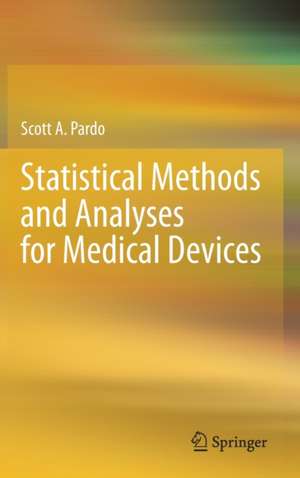Statistical Methods and Analyses for Medical Devices
Autor Scott A. Pardoen Limba Engleză Hardback – 25 apr 2023
While, there are no statistical methods specifically designed for analysis of medical device data, there are some methods that seem to appear regularly in relation to medical devices. For example, the assessment of receiver operating characteristic curves is fundamental to development of diagnostic tests, and accelerated life testing is often critical for assessing the shelf life of medical device products. Another example is sensitivity/specificity computations are necessary for in-vitro diagnostics, and Taguchi methods can be very useful for designing devices. Even notions of equivalence and noninferiority have different interpretations in the medical device field compared to pharmacokinetics. It contains topics such as dynamic modeling, machine learning methods, equivalence testing, and experimental design, for example.
This book is for those with no statistical experience, as well as those with statistical knowledgeable—with the hope to provide some insight into what methods are likely to help provide rationale for choices relating to data gathering and analysis activities for medical devices.
| Toate formatele și edițiile | Preț | Express |
|---|---|---|
| Paperback (1) | 1043.95 lei 38-44 zile | |
| Springer International Publishing – 26 apr 2024 | 1043.95 lei 38-44 zile | |
| Hardback (1) | 1227.84 lei 6-8 săpt. | |
| Springer International Publishing – 25 apr 2023 | 1227.84 lei 6-8 săpt. |
Preț: 1227.84 lei
Preț vechi: 1497.36 lei
-18% Nou
Puncte Express: 1842
Preț estimativ în valută:
234.98€ • 242.74$ • 195.56£
234.98€ • 242.74$ • 195.56£
Carte tipărită la comandă
Livrare economică 25 martie-08 aprilie
Preluare comenzi: 021 569.72.76
Specificații
ISBN-13: 9783031261381
ISBN-10: 3031261380
Pagini: 384
Ilustrații: XIII, 384 p. 153 illus.
Dimensiuni: 155 x 235 mm
Greutate: 0.74 kg
Ediția:2023
Editura: Springer International Publishing
Colecția Springer
Locul publicării:Cham, Switzerland
ISBN-10: 3031261380
Pagini: 384
Ilustrații: XIII, 384 p. 153 illus.
Dimensiuni: 155 x 235 mm
Greutate: 0.74 kg
Ediția:2023
Editura: Springer International Publishing
Colecția Springer
Locul publicării:Cham, Switzerland
Cuprins
1. Some Fundamentals – Probability.- 2. Some Fundamentals – Estimation and Inference.- 3. Confidence.- 4. Power and Hypothesis Testing.- 5. Least Squares: Regression and ANOVA.- 6. Product Design – Factorial Experiments.- 7. Process Control.- 8. Inspection and Acceptance Sampling.- 9. Shelf Life, Stability, Reliability, Time-to-Event.- 10. Diagnostics: Sensitivity and Specificity.- 11. Equivalence and Noninferiority.- 12. Nonparametrics.- 13. Bayesian Methods.- 14. Prediction, Classification, Non-Linear Modeling.- 15. Variance Components and Precision.- 16. Time Series and Dynamic Systems.- 17. Odds, Odds Ratios, and Comparing Proportions.- 18. Afterword.
Notă biografică
Scott Pardo has been applying statistical methods to a wide variety of problems, from military communications networks to pacemaker longevity to pharmacokinetics to injection molding of syringes, for over 40 years. He has spent most of the last 32 years working in the medical device industries, including pacemakers, in-vitro diagnostics, and blood collection tubes. He has written several books on various statistical topics, including Equivalence Testing in Engineering and Problems in Behavioral Ecology (Springer). Dr. Pardo has a Ph.D. in Industrial Engineering (Engineering Statistics) from the University of Southern California, and is a Six Sigma Master Black Belt. He is the author of Equivalence and Noninferiority Testing for Quality, Manufacturing, and Test Engineers, Empirical Modeling and Data Analysis for Engineers and Applied Scientists, Statistical Methods for Field and Laboratory Studies in Behavioral Ecology and Statistical Analysisof Empirical Data: Methods for Applied Sciences.
Textul de pe ultima copertă
This book provides a reference for people working in the design, development, and manufacturing of medical devices. While there are no statistical methods specifically intended for medical devices, there are methods that are commonly applied to various problems in the design, manufacturing, and quality control of medical devices. The aim of this book is not to turn everyone working in the medical device industries into mathematical statisticians; rather, the goal is to provide some help in thinking statistically, and knowing where to go to answer some fundamental questions, such as justifying a method used to qualify/validate equipment, or what information is necessary to support the choice of sample sizes.
There are no statistical methods specifically designed for analysis of medical device data. However, there are some methods that seem to appear regularly in relation to medical devices. For example, the assessment of receiver operating characteristic curves is fundamental to development of diagnostic tests, and accelerated life testing is often critical for assessing the shelf life of medical device products. Another example is sensitivity/specificity computations are necessary for in-vitro diagnostics, and Taguchi methods can be very useful for designing devices. Even notions of equivalence and noninferiority have different interpretations in the medical device field compared to pharmacokinetics. It contains topics such as dynamic modeling, machine learning methods, equivalence testing, and experimental design, for example.
This book is for those with no statistical experience, as well as those with statistical knowledgeable—with the hope to provide some insight into what methods are likely to help provide rationale for choices relating to data gathering and analysis activities for medical devices.
Caracteristici
Focuses on methods useful for medical device development and manufacturing Provides R code for all methods, with sample datasets Guides readers to methods relating to data gathering and analysis activities for medical devices
